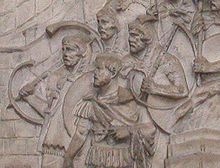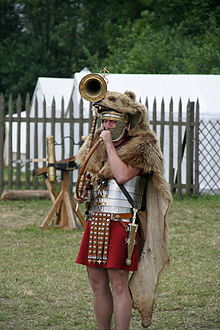- Cornu (horn)
-
A cornu or cornum (Latin: cornū, cornum; often translated cornet; revived as the tuba curva) was a type of brass instrument similar to the buccina used by the Roman army of antiquity mainly for communicating orders to troops in battle. It is a Latin word literally meaning horn. The instrument was about 3 m (9.8 ft) long and took the form of a letter 'G'. The instrument was braced by a crossbar that stiffened the structure and provided a means of supporting the instrument's weight on the player's shoulder. Two specimens survive from the ruins of Pompeii.
The cornu was carried by the cornicen (horn-blower) who coded the general's orders into signals and broadcast them over the field during battles. The cornicen's horn curved around his body. The Roman army also made use of a straight trumpet called a tuba (different from the modern tuba).
The late Roman writer Vegetius, in his work De Re Militari, wrote:
- The music of the legion consists of trumpets, cornets and buccinae. The trumpet sounds the charge and the retreat. The cornets are used only to regulate the motions of the colors; the trumpets serve when the soldiers are ordered out to any work without the colors; but in time of action, the trumpets and cornets sound together. The classicum, which is a particular sound of the buccina or horn, is appropriated to the commander-in-chief and is used in the presence of the general, or at the execution of a soldier, as a mark of its being done by his authority. The ordinary guards and outposts are always mounted and relieved by the sound of trumpet, which also directs the motions of the soldiers on working parties and on field days. The cornets sound whenever the colors are to be struck or planted. These rules must be punctually observed in all exercises and reviews so that the soldiers may be ready to obey them in action without hesitation according to the general's orders either to charge or halt, to pursue the enemy or to retire. For reason will convince us that what is necessary to be performed in the heat of action should constantly be practiced in the leisure of peace.[1]
The cornu was revived as the "tuba curva" during the French Revolution. The tuba curva was first used in music that André Grétry composed for the funeral of Voltaire.[2]
References
- ^ De Re Militari, Vegetius, Book II
- ^ Grove's Dictionary of Music and Musicians, 5th ed, 1954
External links
Categories:- Ancient Roman legionary equipment
- Ancient Roman musical instruments
- Brass instruments
Wikimedia Foundation. 2010.


